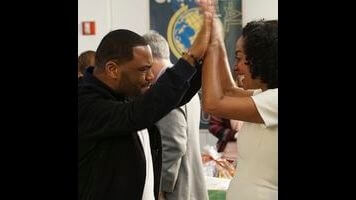“The Johnson Show” does what Black-ish does best: It keeps it real

“Growing up with a single mom who worked all the time, I made best friends with my TV. Watching TV expanded my world. It showed me how different I was from other people. It made me want a family like the Keatons or the Seavers or the Bradys. The only problem is: They didn’t look like me. It wasn’t until the Huxtables that I saw the family I could be. And current controversy aside, that show made this 11-year-old black boy believe one day, he too could have a perfect family just like that. A family anchored by two loving parents, who have amazing careers. And now I have that.”
I was never a Cosby Show kid. While, like Dre, I was essentially raised by TV and got a lot of exposure to white families in sitcoms like Growing Pains and The Brady Bunch, the black family sitcoms that drew me in were The Fresh Prince Of Bel-Air and early, grounded Family Matters. The Bankses were that aspirational television family to me; Uncle Phil was a powerful lawyer-turned-judge and Aunt Viv (number one, at least) was a highly-educated professor. Then, even Boy Meets World eventually came out with the representation in the character Angela and by pairing her up with Shawn Hunter, which allowed me (a black girl with a white step-father) to see a couple that looked sort of like my parents, on TV. It allowed me to see an interracial relationship be treated as important and not abnormal. Then there was The Bernie Mac Show, and I’ve said it before, but I believe Black-ish and The Carmichael Show do a great job filling that television void as well.
It helps that “The Johnson Show” is a perfect Black-ish episode from top to bottom. Obviously, this season’s “Hope” was the most poignant episode of the series and allowed Black-ish to be experimental without going into full gimmick mode, but as far as “typical” Black-ish episode go, “Hope” doesn’t quite fit that criteria. “The Johnson Show,” however, manages to take all of Black-ish’s strength as a family sitcom with heart—and better yet, a brain—and make something both relevant and hilarious. It doesn’t do so by making it a Very Special Episode or something that feels like an outlier. It just begins with a smoke screen plot that feels tailor-made for Dre to go “full Dre” and drive everyone else insane.
The fact that the lay-off plot at Stevens & Lido (aka Lido & Stevens, aka Lido’s Place) doesn’t turn into one about masculinity, machismo, gender norms, and everything in between is basically a black Jesus-sent miracle, given Dre’s past obsessions. As usual, there’s practically a countdown clock until Dre lets his co-workers get into this head, but the clock never runs out this time around. When Pops try to bring the husband-wife dynamics into the discussion, Dre doesn’t take the bait, which even makes for the most pleasantly surprising part of the episode. Instead, Dre approaches this as pragmatically as he can, even doing his best to learn about rural markets and blood removal in order to secure his position at Stevens & Lido.
Plus, it’s simply just a tight plot, which can go a long way. Because while it’s easy to assume that everything will be alright for Dre because of his position as head of “black stuff,” the episode immediately shuts that down (and makes Dre possibly expendable) with one simple and true analogy from Stevens, of all people:
“Okay, put it this way: The day I learned what ‘on fleek’ meant was the day that the urban market was no longer ‘on fleek’.”
 Keep scrolling for more great stories.
Keep scrolling for more great stories.
